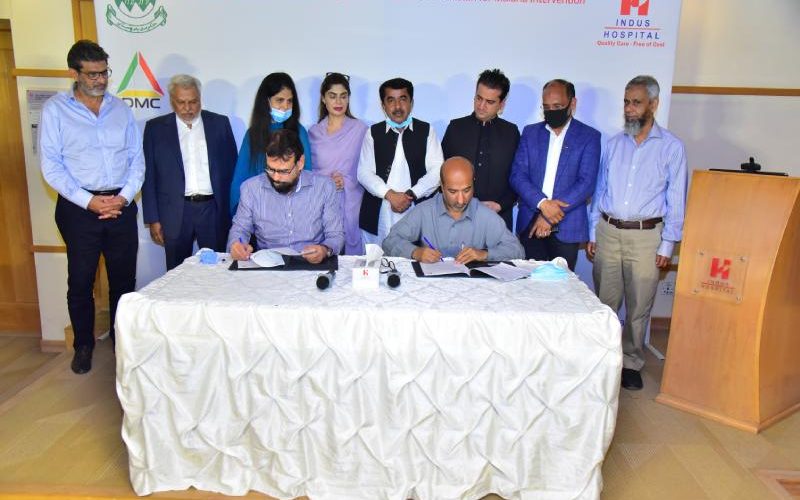INDUS HOSPITAL AND HEALTH NETWORK SIGNS MOU WITH THE GOVERNMENT OF BALOCHISTAN FOR ROLLOUT OF GFATM MALARIA GRANT IN BALOCHISTAN
Karachi: The Indus Hospital and Health Network (IHHN) and the Provincial Health Department, Balochistan signed a Memorandum of Understanding (MoU) on March 6, 2021 at the Indus Hospital, (TIH) Korangi Campus. TIH is the private sector Principal Recipient of Global Fund to Fight AIDS, Tuberculosis and Malaria (GFATM). IHHN is managing GFATM Malaria grant in 34 districts of Pakistan out of which 21 districts are of Balochistan. Noor-ul-Haq Baloch, Director General Health, Provincial Health Department, Balochistan and Dr. Abdul Bari Khan, Chief Executive Officer, IHHN signed the MoU.
Malaria is a major public health problem in Pakistan. According to the World Malaria Report 2019, approximately, 28.9% of the Pakistani population lives in areas at high risk for Malaria, 69.4% at low and medium risk and the only 1.7% live in areas with no risk of Malaria transmission. A great proportion of Malaria cases are still diagnosed and treated on clinical grounds. Information on deaths due to malaria is very limited, and Malaria mortality is not being regularly reported.
IHHN is partnering with global fund in the fight against Malaria since 2016 as private sector principal recipient. Owing to its good performance, close coordination with department of health and its partners, the Global Fund has continued its partnership with The Indus Hospital for another 3 years till 2023. It has showed its trust on The Indus hospital by increasing its scope from 19 to 34 district, reaching out to 24,338,069 people through 2794 health facilities in these districts.
In Balochistan there are 21 target districts. The Indus Hospital will now be providing quality diagnosis, treatment and preventive services to 5,355,880 people through 1,616 health facilities and distribution of some 2.9 Million LLINs in these 21 districts of Balochistan
This MoU is basically aimed to cover areas of cooperation between the Department of Health Balochistan and IHHN for smooth and timely implementation of the Malaria grant in the selected districts of Balochistan. The MoU clearly identifies the roles and responsibilities of both parties in implementation of Malaria grant activities in target districts of Balochistan where the grant will be managed by IHHN.
The goal of this partnership and collaboration is to reduce the Malaria incidence. All age groups of people living in the 21 high endemic districts of Balochistan will be targeted. Specific groups including pregnant women, labor migrants, nomads, IDPs from crisis -affected areas, refugees and people living in under-developed regions with poor socio-economic conditions in intervention districts will be reached through this Grant.
The Global Fund is a partnership designed to accelerate the end of AIDS, TB, and Malaria as epidemics. As an international organization, the Global Fund mobilizes and invests to support programs run by local experts in more than 100 countries.
The event started with the recitation of the Holy Quran. Abdul Karim Paracha, Chairman, Board of Governor, IHHN welcomed the esteemed guests. Syed Mashhood Rizvi, Executive Director, Communication and Resource Development, IHHN briefed about IHHN.
Dr. Mah Talat, Director Malaria, Project Management Unit, presented an overview of the Malaria program.
In their remarks, representatives of the Global Fund, Werner Buhler and Miss Jessica Jackley said that they are impressed with the spirit of working together and excellent collaboration between the partnering organizations. Werner said because of the compassion and professionalism, we have seen tremendous results. He thanked all the private and public recipients of the grant for their commitment to make Pakistan Malaria free.
Secretary Health, Provincial Health Department, Balochistan Noorul Haq Baloch appreciated IHHN for its health interventions in Balochistan. Dr. Mukhtar, Director, Directorate of Malaria Control Program shared his experience of working with the Global Fund and IHHN. He said that the reason for the success of this program lies in the flawless coordination between all partners. He said that this MoU is of historical importance for Balochistan and we will collectively make it successful. In his closing remarks, Dr. Bari’s closing remarks he congratulated the Team Pakistan and said that by 2023 we’ll make Pakistan free of Malaria. The signing ceremony took place and the event concluded.
Indus Hospital and Health Network
Initiated by a group of professionals with the support of some philanthropists and businessmen, in 2007, The Indus Hospital (TIH) started its journey with a purpose to provide indiscriminate, quality healthcare to all in a state-of-the-art, paperless, 150-bed hospital in Korangi, Karachi.
TIH has now evolved into the Indus Hospital and Health Network (IHHN) which is managing 12 hospitals across Pakistan. The Network also has a country-wide network of primary care clinics and outreach programs.
The Indus Hospital, Korangi Campus, Karachi is being expanded to a 1,350-bed facility while a state-of-the-art, 600-bed tertiary care hospital is being constructed in Lahore. Both hospitals are associated with the Indus University of Health Sciences.
IHHN is running four physical and rehabilitation centers in Karachi, Lahore, Muzaffargarh, and Badin. IHHN has four regional blood centers in Multan, Bahawalpur, Jamshoro, and Karachi.




